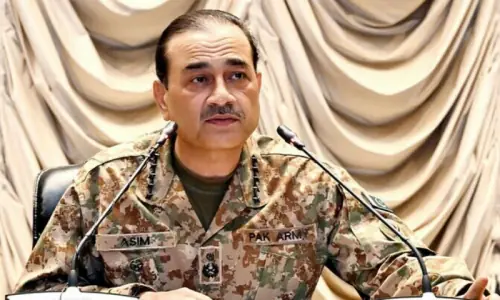WHILE it is appreciable that a solid monument is to be soon erected in Islamabad to symbolise the profundity of the Constitution, the record shows that the 1973 charter remains quite malleable. According to the Oxford Dictionary, malleability is the capacity of “... a material to be hammered or pressed permanently out of shape without breaking or cracking”. In this context, is malleability a virtue or a flaw? Perhaps no definitive answers are possible.
All constitutions are subject to amendment in response to changed conditions and experience. The exceptional malleability of the 1973 Constitution is its remarkable capacity for major changes — by both elected legislatures and unelected military regimes, the latter being notably aided by judicial sanction, eg, the doctrine of necessity. But even elected legislatures have retained some progressive amendments made by military rulers, eg, increased seats for women, restoration of the voting age to 18 years instead of 21, and of joint electorates, the expanded size of legislatures (under Gen Musharraf), the authority of an indirectly elected Senate to initiate Constitution amendment bills and debate money bills (under Gen Ziaul Haq).
Like a pendulum that swings from one extreme to the other, so too did the original 1973 version undergo a 180-degree shift, with such shifts lasting years, not seconds. Starting with a head of state who was a ceremonial decoration without a single discretionary power — except for the authority to grant mercy petitions — the prime minister’s imbalanced, all-powerful position was in full play till July 4, 1977. Indeed, one of the basic reasons for the 1977 upheaval was the excessive use of prime ministerial power for five years. The PM’s dominance was suspended under martial law onward of July 5, 1977 — when the chief martial law administrator became the supreme executive authority. This was reinforced after president Fazal Elahi Chaudhry’s exit in September 1978 when the CMLA became president while remaining COAS/CMLA.
When Junejo became PM on March 24, 1985, the president’s powers were only partly eroded. Even with the end of martial law on Dec 30, 1985, the pendulum stayed on the president’s side because the Eighth Amendment earlier in 1985 had bestowed Article 58(2)(b) on the president, enabling the dismissal of the PM and dissolution of the legislatures at the president’s discretion. It took 12 years for the 13th Amendment in 1997 to delete this provision. During military regimes, the superior courts were able to entertain writs and petitions, and adjudicate on civil legal matters.
The Constitution has shown remarkable capacity for change.
A sign of semantic confusion even in 2023 was evident when, on March 29, 2023, during an interview on a TV channel, the present head of state, and the interviewer, referred to the multiple ‘abrogations’ of the Constitution, while both also acknowledged its durability! ‘Abrogation’ means ‘repeal’ or to ‘do away with (permanently)’. It should be remembered that the 1973 Constitution was never ‘abrogated’ de jure. It remained partly in place during both the military regimes of 1977-1985/1988 and 1999-2002/2008. Which is why petitions challenging military intervention were heard and judged in the Supreme Court.
Recent and ongoing comments about the democratic dimension of the Constitution ignore hard, inconvenient truths. Its original version was distorted by civilian, not military action, in less than a year. The First Amendment of May 1974, ostensibly redefining the territorial composition of the state post-1971 was also used to, among other things, allow judges from one province to be transferred to the high court of another province. A total of 17 changes were made under the misleading singularity of the term ‘First Amendment’. Later, in 1976 and May 1977, the Fourth, Fifth and Sixth Amendments, consisting of several alterations, adversely impacted the judiciary. An abortively attempted amendment in 1997 aimed to make the PM ‘ameerul momineen’, accountable only to a captive legislative two-thirds majority.
The Constitution’s pliability to change — while surviving — is aptly evident in the numbers. By one count, there have been only ‘26’ amendments in 50 years, ie, only about two per year! In actual fact, changes, for better and worse, number hundreds of alterations, each such change being an ‘amendment’.
In 1985, for example, the Eighth Amendment actually introduced changes in about 65 articles through modifications, omissions, deletions, additions and links to other articles. Where the intention to introduce purposeful references to the Constitution in the education curriculum is laudable, such texts should also inform students about its charming malleability under both civilian and military rulers.
The writer is a former senator and federal minister and author of, among other books, Pakistan — unique origins; unique destiny?
www.javedjabbar.net
Published in Dawn, April 15th, 2023

































